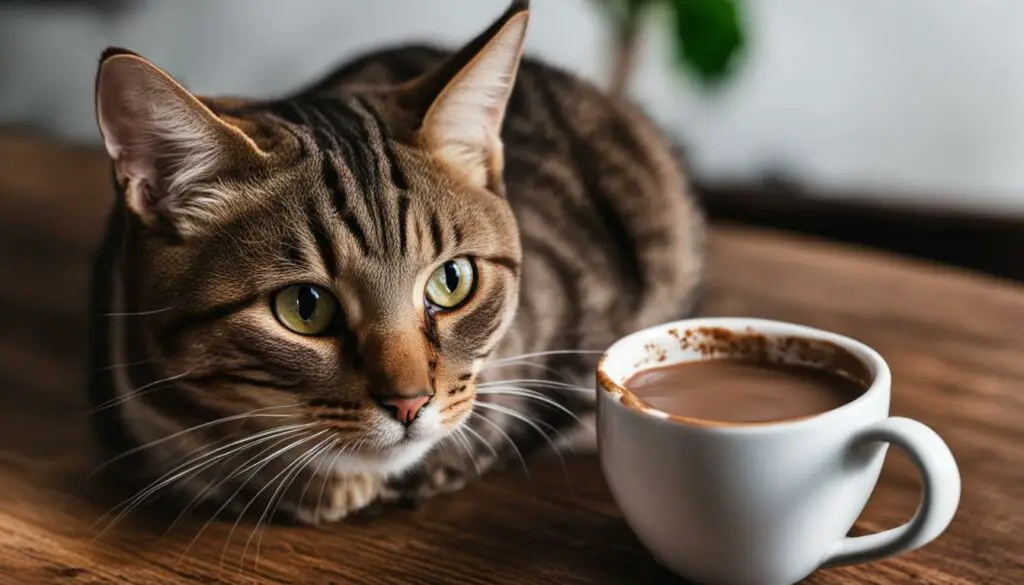As a cat owner, you may be curious about what foods are safe for your feline friend to consume. One common question that arises is whether cats can have chocolate milk. In this article, we will explore the truth behind cats and chocolate milk, shedding light on the potential dangers and risks associated with this popular beverage.
Key Takeaways:
- Chocolate milk is not the best choice for cats, as it contains lactose, caffeine, and theobromine, which can be harmful to their health.
- Cats are obligate carnivores and their diet should consist primarily of meat. While they can tolerate small amounts of dairy, many cats are lactose intolerant.
- Chocolate milk can cause digestive issues, such as diarrhea and vomiting, in cats who are lactose intolerant.
- The theobromine and caffeine in chocolate milk can have negative effects on a cat’s cardiovascular and nervous systems if consumed in large amounts.
- It’s best to avoid giving chocolate milk to cats altogether and provide them with a balanced diet that meets their specific nutritional needs.
Understanding Cats and Their Dietary Needs
As obligate carnivores, cats have unique dietary requirements that primarily consist of meat. While cats can tolerate small amounts of dairy, such as milk, it’s important to understand that many cats are lactose intolerant and cannot digest lactose properly. This intolerance can lead to gastrointestinal upset and discomfort when cats consume dairy products, including chocolate milk.
When it comes to chocolate milk, there are additional reasons why it may not be suitable for cats. Firstly, chocolate milk contains lactose, which can cause digestive issues in cats who are lactose intolerant. Secondly, chocolate milk also contains caffeine and theobromine, both of which can be harmful to cats if consumed in large amounts. These stimulants can have negative effects on a cat’s cardiovascular and nervous systems.
It’s important to monitor your cat for any adverse reactions when introducing new foods like chocolate milk. Every cat is unique and may have different reactions to dairy products. Some cats may be more sensitive than others, and even small amounts of chocolate milk may cause digestive upset or other health issues in certain individuals. If you notice any concerning symptoms or changes in your cat’s behavior after consuming chocolate milk, it’s best to consult with a veterinarian for guidance.
| Effects of Chocolate Milk on Cats | Reactions |
|---|---|
| Digestive issues | Vomiting, diarrhea |
| Cardiovascular and nervous system effects | Restlessness, increased heart rate |
| Severity of symptoms | Depends on the cat’s individual tolerance and the amount consumed |
It’s crucial to prioritize a balanced diet that meets a cat’s specific nutritional needs, without the addition of chocolate milk or other sugary beverages.
The Risks of Continuous Consumption
While an occasional small taste of chocolate milk may not have immediate harmful effects, it’s essential to consider the cumulative risks of continuous consumption. The sugar and lactose content in chocolate milk can contribute to digestive issues and weight gain in cats. Excessive consumption of chocolate milk can lead to feline obesity, which in turn increases the risk of developing obesity-related health issues such as diabetes, joint problems, and heart disease.
To ensure the well-being of your cat, it’s best to provide a balanced diet that meets their specific nutritional needs. If you want to offer your cat a milk alternative, consider lactose-free milk that eliminates the lactose intolerance issue. However, it’s important to note that even with lactose-free milk, moderation is key, as excessive consumption can still lead to health problems in cats.
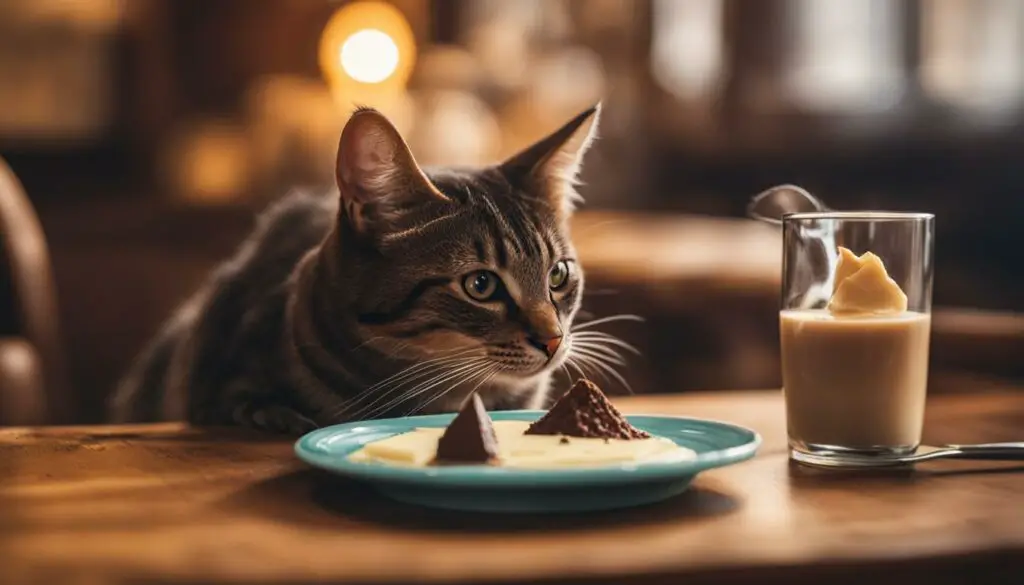
The Potential Dangers of Chocolate Milk for Cats
While cats may find chocolate milk tempting, it is important to understand the potential dangers it poses to their health. Chocolate milk contains several ingredients that can be harmful to cats, especially in large quantities.
Lactose and sugar: Chocolate milk contains lactose, which many cats cannot digest properly. This can lead to gastrointestinal upset, including symptoms like diarrhea and vomiting. The sugar content in chocolate milk can also contribute to digestive issues in cats.
Caffeine and theobromine: Chocolate milk contains caffeine and theobromine, both of which are stimulants. While not toxic in small amounts, these substances can have negative effects on a cat’s cardiovascular and nervous systems if consumed in large quantities. It is important to note that kittens, in particular, should never be given chocolate milk, as their developing digestive systems may be even more sensitive to these ingredients.
Therefore, it is advisable to avoid giving chocolate milk to cats altogether. Instead, provide them with a balanced diet that meets their specific nutritional needs and consider offering lactose-free milk or other milk alternatives that are safe for feline consumption.
Table: Potential Dangers of Chocolate Milk for Cats
| Potential Dangers | Effects on Cats |
|---|---|
| Lactose and sugar | Gastrointestinal upset, diarrhea, vomiting |
| Caffeine and theobromine | Negative effects on cardiovascular and nervous systems in large quantities |
The Harmful Effects of Chocolate on Cats
When it comes to chocolate and cats, it’s important to understand that chocolate can be extremely harmful to our feline friends. Chocolate contains two substances, namely theobromine and caffeine, both of which can be toxic to cats when ingested in sufficient quantities. These compounds can have a negative impact on a cat’s cardiovascular and nervous systems, leading to symptoms such as vomiting, diarrhea, and abdominal pain.
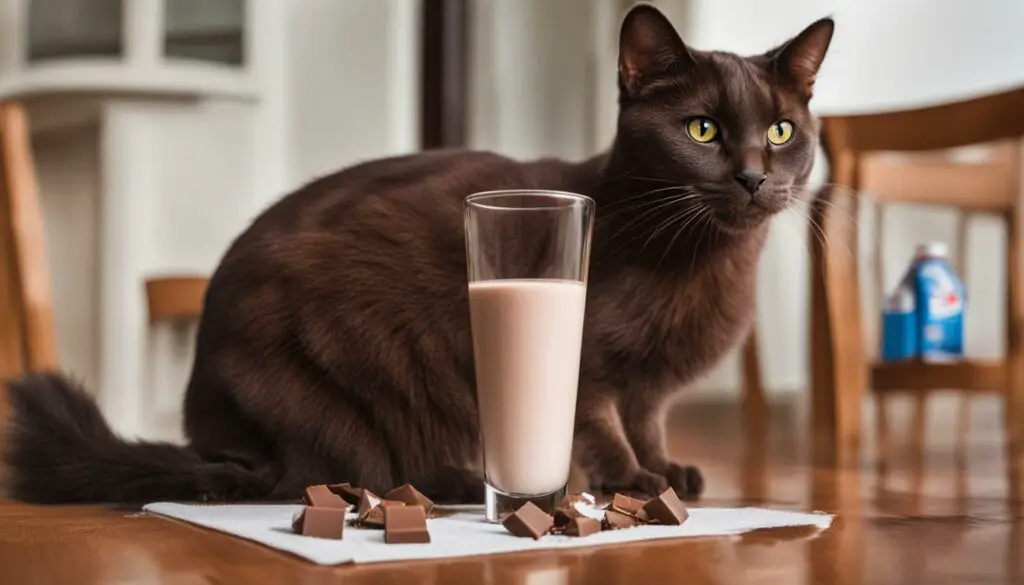
Even a small amount of chocolate milk can cause gastrointestinal distress in cats due to the sugar and lactose content. Cats, being obligate carnivores, are not designed to digest lactose, and consuming chocolate milk can lead to digestive issues like diarrhea and vomiting. Additionally, chocolate milk contains theobromine and caffeine, both of which can have stimulant effects on cats, potentially causing restlessness and even seizures in severe cases.
To keep your cat safe and healthy, it’s best to avoid giving them chocolate milk altogether. Instead, provide them with a balanced diet that meets their specific nutritional needs. If you suspect or witness your cat consuming chocolate milk, it’s important to take immediate action by removing any remaining chocolate milk and monitoring your cat for any unusual symptoms. If you notice any signs of gastrointestinal distress or other concerning behaviors, it’s crucial to contact your veterinarian for guidance and potential medical intervention.
Understanding Chocolate Toxicity in Cats
When it comes to cats and chocolate milk, it’s important to understand the potential risks and effects it can have on feline health. Chocolate contains theobromine, a compound that cats are unable to metabolize efficiently like humans. Theobromine can build up to toxic levels in a cat’s system, leading to chocolate toxicity.
The severity of chocolate toxicity depends on the type and amount of chocolate consumed. Dark chocolate and baking chocolate have higher levels of theobromine and are more dangerous for cats. While chocolate milk is diluted compared to other chocolate products, it still contains theobromine and can be harmful if consumed in large quantities.
It’s crucial to keep chocolate milk and other chocolate products out of reach of cats, as ingestion can lead to various symptoms. These symptoms can range from vomiting and diarrhea to more severe issues such as tremors, seizures, and even death in some cases. Immediate veterinary attention is necessary if a cat exhibits any signs of chocolate toxicity.
Remember, cats are obligate carnivores, and their diet should primarily consist of meat. While some cats may enjoy the taste of milk, including chocolate milk, it is not a suitable beverage for them. It’s best to provide cats with a balanced diet that meets their specific nutritional needs and avoid giving them chocolate milk or other sugary beverages altogether.
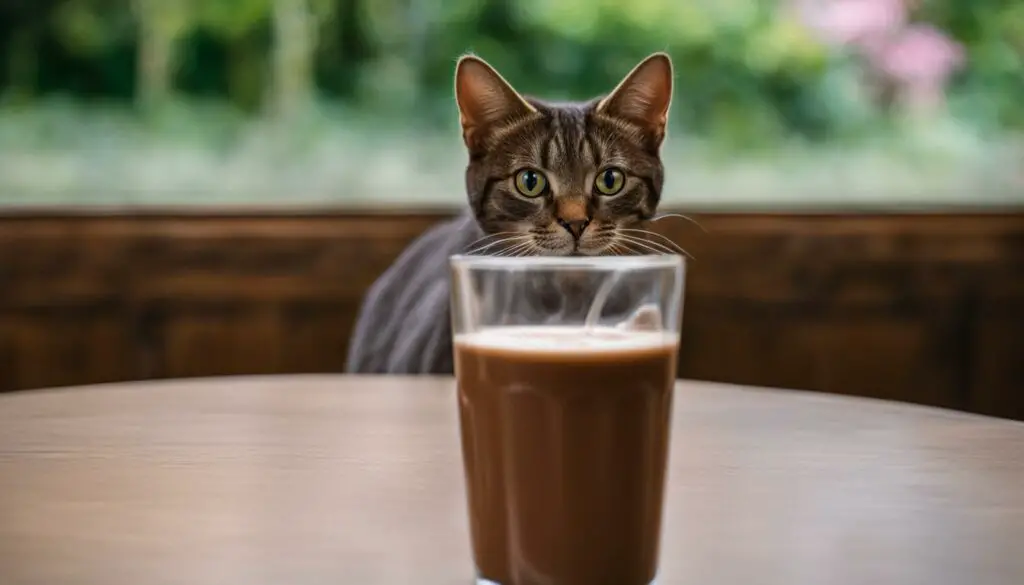
The Risks of Chocolate Milk for Cats
When it comes to cats and chocolate milk, there are several risks to be aware of. While cats may be curious about this sweet beverage, it’s important to understand the potential dangers it poses to their health. Chocolate milk contains ingredients that can be harmful to cats, including sugar, lactose, caffeine, and theobromine.
The sugar and lactose content in chocolate milk can lead to digestive issues in cats, such as diarrhea and vomiting. Cats are often lactose intolerant, meaning their bodies cannot properly digest lactose, the sugar found in milk. Additionally, chocolate milk contains caffeine and theobromine, which can have adverse effects on a cat’s cardiovascular and nervous systems if consumed in large amounts.
While the concentration of these substances is lower in chocolate milk compared to other chocolate products, continuous consumption can still lead to cumulative health issues in cats. That’s why it’s best to avoid giving chocolate milk to cats altogether and provide them with a balanced diet that meets their specific nutritional needs. It’s important to prioritize their health and well-being by offering them safe and suitable alternatives.

The Risks at a Glance
| Type of Risk | Description |
|---|---|
| Gastrointestinal Distress | The lactose and sugar in chocolate milk can cause digestive issues like diarrhea and vomiting in cats. |
| Cardiovascular Effects | The caffeine and theobromine in chocolate milk can have adverse effects on a cat’s heart and blood pressure. |
| Nervous System Impact | The caffeine and theobromine in chocolate milk can affect a cat’s nervous system, potentially leading to restlessness and tremors. |
“Chocolate milk contains ingredients that can be harmful to cats, including sugar, lactose, caffeine, and theobromine.”
In summary, chocolate milk poses risks for cats due to its ingredients, including sugar, lactose, caffeine, and theobromine. These substances can lead to gastrointestinal distress, cardiovascular effects, and impacts on the nervous system. While small amounts may not cause immediate harm, continuous consumption can lead to cumulative health issues. It’s best to prioritize your cat’s health by avoiding chocolate milk altogether and providing them with a balanced diet that meets their specific nutritional needs.
Understanding Cat Reactions to Chocolate Milk
Cats may have varying reactions to chocolate milk based on their individual tolerance and sensitivity. While some cats may show immediate signs of gastrointestinal upset after consuming chocolate milk, others may not display noticeable symptoms until they have consumed larger amounts. It is important for cat owners to be aware of their cat’s reactions and not assume that all cats will have the same response to chocolate milk.
Some cats may experience gastrointestinal distress such as vomiting, diarrhea, or abdominal pain shortly after consuming chocolate milk. These symptoms can be attributed to the presence of lactose and sugar in chocolate milk, which can disrupt a cat’s digestive system. Additionally, the caffeine and theobromine in chocolate milk can have negative effects on a cat’s nervous system and heart if consumed in large quantities.
It’s crucial to closely monitor your cat for any adverse reactions when introducing new foods like chocolate milk. If you notice any signs of gastrointestinal upset or unusual behavior after consuming chocolate milk, it is recommended to consult with a veterinarian. They can provide guidance on how to manage the situation and determine if any medical intervention is necessary for your cat’s well-being.
| Cat Reactions to Chocolate Milk | Possible Symptoms |
|---|---|
| Immediate intolerance | Vomiting, diarrhea, abdominal pain |
| Delayed intolerance | Gradual onset of gastrointestinal upset |
| Increased sensitivity | Restlessness, nervousness, rapid heartbeat |
Understanding Cat Sensitivities
Each cat is unique, and their sensitivities to certain foods can vary. Some cats may be more sensitive to lactose and sugar, while others may have heightened sensitivity to caffeine and theobromine. It is important to observe your cat’s reactions when introducing any new food or beverage into their diet, including chocolate milk.
“While not all cats will have adverse reactions to chocolate milk, it is best to err on the side of caution and avoid giving it to your cat altogether.”
By paying close attention to your cat’s reactions and seeking veterinary advice when needed, you can ensure that their diet and well-being are well-maintained. It’s important to remember that while cats may enjoy the taste of milk, it is not a necessary part of their diet and can often be substituted with lactose-free milk alternatives or other appropriate treats.
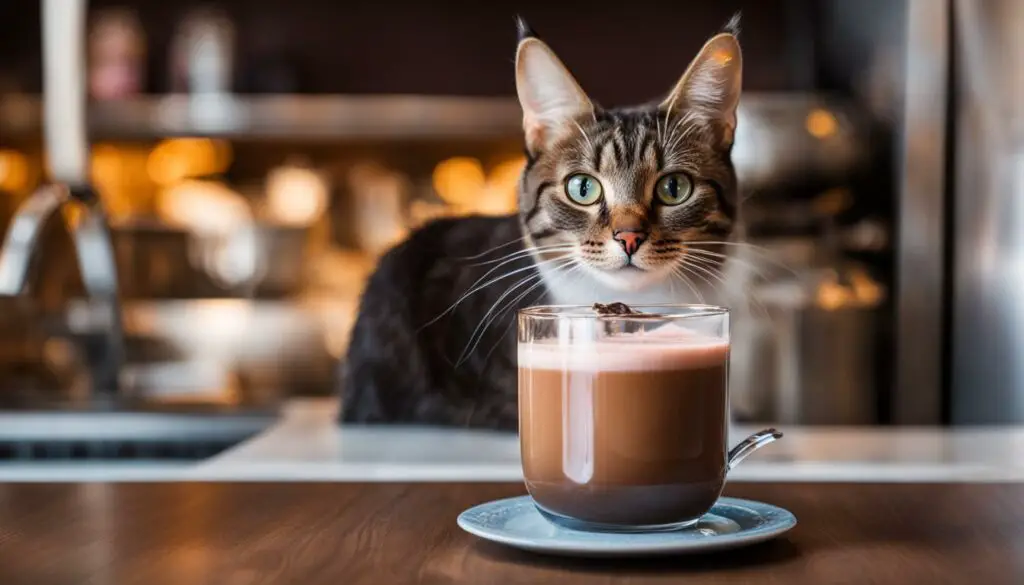
Chocolate Milk Consumption and Feline Obesity
When it comes to cats and their health, proper nutrition is essential. While cats may enjoy the taste of chocolate milk, it’s important to understand the potential risks and consequences of allowing them to consume this treat. Not only does chocolate milk contain ingredients that can be harmful to cats, but it can also contribute to feline obesity.
Excessive consumption of chocolate milk can lead to weight gain in cats, placing them at a higher risk of developing obesity-related health issues. These can include diabetes, joint problems, and heart disease. Just like in humans, obesity can have serious consequences for a cat’s overall well-being and quality of life.
| Health Risks of Feline Obesity | Prevention and Management |
|---|---|
| Diabetes | Feed a balanced diet tailored to a cat’s specific needs |
| Joint Problems | Monitor portion sizes and encourage regular exercise |
| Heart Disease | Avoid feeding high-calorie treats like chocolate milk |
To ensure the well-being of your feline companion, it’s best to provide them with a balanced diet that meets their nutritional needs without unnecessary additions like chocolate milk. Opting for specialized cat food that is formulated for their dietary requirements is the best way to keep them healthy and maintain a proper weight.
Remember, while the occasional treat may be fine for some cats, it’s important to consider their overall health and well-being. Chocolate milk should be avoided to minimize the risk of obesity and associated health problems. If you have concerns about your cat’s weight or diet, consult with your veterinarian for guidance and tailored advice.
What Happens If a Cat Drinks Chocolate Milk?
If a cat drinks chocolate milk, it can have various adverse effects on their health. The combination of lactose, sugar, caffeine, and theobromine in chocolate milk can disrupt a cat’s digestive system, leading to symptoms such as vomiting, diarrhea, and abdominal pain. These gastrointestinal issues can cause discomfort and distress for the cat, and it’s important to monitor their condition closely.
In addition to digestive problems, the stimulants present in chocolate milk, namely caffeine and theobromine, can have negative effects on a cat’s nervous system and heart. Restlessness, increased heart rate, and even seizures may occur in severe cases. These reactions can be alarming and indicate a toxic buildup of these substances in the cat’s system.
If you observe any of these symptoms in your cat after it has consumed chocolate milk, it’s crucial to seek veterinary attention immediately. A veterinarian will be able to assess the severity of the situation and provide proper treatment if necessary. Prompt action is essential to ensure the well-being and safety of your cat.
| Effects of Chocolate Milk on Cats |
|---|
| Vomiting |
| Diarrhea |
| Abdominal pain |
| Restlessness |
| Increased heart rate |
| Seizures |
Remember, prevention is always better than cure. It’s best to avoid giving chocolate milk to cats altogether. Providing a balanced diet that meets their specific nutritional needs will help ensure their well-being and reduce the risk of any adverse reactions or health issues.
How Much Chocolate Milk Can a Cat Have?
When it comes to chocolate milk, cats should not regularly consume this beverage. While a small amount may not cause immediate harm, the cumulative effects of the sugar, lactose, caffeine, and theobromine in chocolate milk can negatively impact a cat’s health over time. It’s best to avoid giving chocolate milk to cats altogether and focus on providing them with a balanced diet that meets their specific nutritional needs.
Cats are obligate carnivores, meaning their diet should primarily consist of meat. While they can tolerate small amounts of dairy, many cats are lactose intolerant and cannot digest lactose properly. Chocolate milk, in particular, contains lactose, which can cause gastrointestinal upset in cats. Additionally, the caffeine and theobromine in chocolate milk can have adverse effects on a cat’s cardiovascular and nervous systems. Continuous consumption of chocolate milk can lead to cumulative health issues for cats.
If you’re looking for alternatives to chocolate milk, consider lactose-free milk specifically formulated for cats. Lactose-free milk eliminates the issue of lactose intolerance and can be a safer option. Additionally, there are other milk alternatives on the market, such as coconut milk and almond milk, that can be given to cats sparingly. It’s important to read the ingredient labels and choose milk alternatives without added sugars or other harmful ingredients.
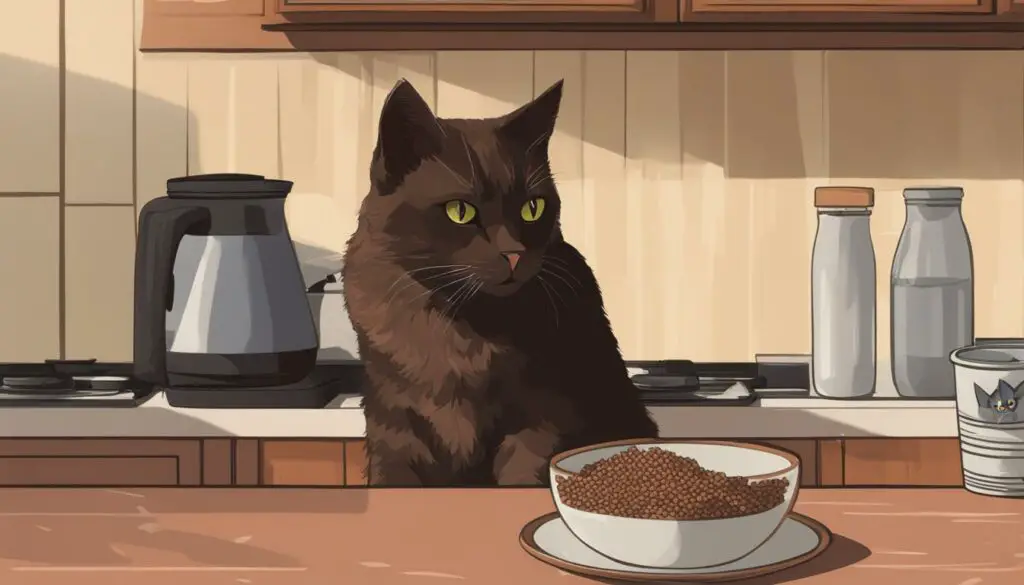
The Risks of Offering Cats Chocolate Cereal Milk
While discussing chocolate milk, it’s crucial to highlight that cats should never be given chocolate cereal milk. The chocolate flavoring in cereal milk contains theobromine, which can be toxic to cats even in small amounts. It’s important to keep all chocolate and chocolate-flavored products away from cats to prevent accidental ingestion and potential poisoning.
The Importance of Taking Action If a Cat Consumes Chocolate Milk
As a responsible cat owner, it is crucial to take immediate action if you suspect or witness your cat consuming chocolate milk. While chocolate milk is not necessarily poisonous to cats, it contains ingredients that can have negative effects on their health. Here are the steps you should take:
- Remove any remaining chocolate milk: If you discover your cat drinking chocolate milk, quickly remove any remaining liquid to prevent further ingestion. This will help minimize the potential harm caused by the ingredients in chocolate milk.
- Monitor your cat for symptoms: After your cat has consumed chocolate milk, closely observe their behavior. Look out for any signs of gastrointestinal distress such as vomiting, diarrhea, or abdominal pain. Restlessness and unusual behavior may also indicate a negative reaction to the ingredients in chocolate milk.
- Contact your veterinarian: If you notice any concerning symptoms or behaviors in your cat after consuming chocolate milk, it is essential to seek veterinary attention. Your veterinarian will be able to provide guidance on how to manage the situation and determine if any medical intervention is necessary.
Remember, early detection and prompt action can help prevent further complications and ensure the well-being of your feline companion.
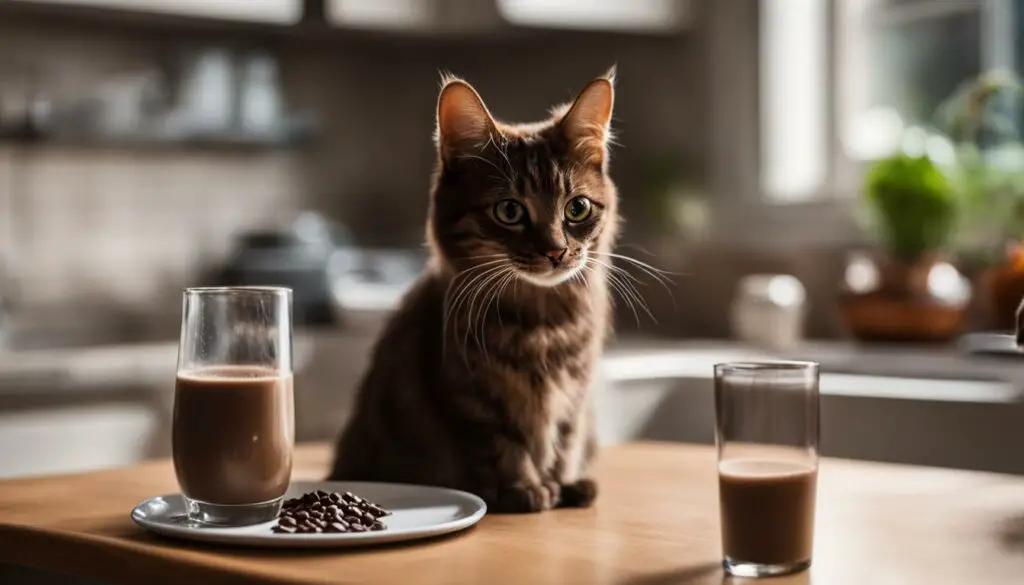
| Signs of Chocolate Milk Ingestion | Steps to Take |
|---|---|
| Vomiting | Remove any remaining chocolate milk and monitor for further symptoms. Contact your veterinarian if vomiting persists or worsens. |
| Diarrhea | Keep your cat hydrated and monitor their bowel movements. If diarrhea continues or becomes severe, seek veterinary advice. |
| Abdominal pain | Observe your cat for signs of discomfort or tenderness in the abdominal area. If pain persists, consult with your veterinarian for appropriate care. |
| Restlessness | Monitor your cat’s behavior for signs of restlessness, pacing, or unusual agitation. Seek veterinary assistance if restlessness persists or worsens. |
Cats and Lactose-Free Milk Alternatives
While chocolate milk is not a suitable option for cats, there are alternatives available that can provide a safe and satisfying treat for your feline friend. Lactose-free milk is a great option as it eliminates the issue of lactose intolerance, which many cats struggle with. Lactose-free milk is specially formulated to be easily digestible for cats, ensuring they can enjoy the taste of milk without any gastrointestinal discomfort.
In addition to lactose-free milk, there are other milk alternatives that can be given to cats sparingly. Coconut milk and almond milk are popular choices, but it’s important to read the ingredient labels to ensure they do not contain added sugars or other harmful ingredients. It’s always best to introduce new foods gradually and monitor your cat for any adverse reactions.
When offering milk alternatives to cats, it’s important to remember that moderation is key. While these alternatives may be safer than chocolate milk, they should still be given sparingly to avoid any potential health issues. It’s also important to prioritize a balanced diet that meets your cat’s specific nutritional needs, as milk alternatives should not replace their main source of nutrition.
| Milk Alternatives | Taste | Lactose-Free | Added Sugars |
|---|---|---|---|
| Lactose-Free Milk | Similar to regular milk | Yes | No |
| Coconut Milk | Mildly sweet with a hint of coconut flavor | Yes | No |
| Almond Milk | Mild nutty flavor | Yes | No or minimal |
Please note: While milk alternatives can be a tasty treat for cats, it’s important to consult with your veterinarian before introducing any new foods into your cat’s diet. They can provide personalized advice based on your cat’s specific health needs and dietary requirements.
The Risks of Offering Cats Chocolate Cereal Milk
When it comes to feeding our feline friends, it’s important to be aware of what foods are safe and what should be avoided. One such food that should never be given to cats is chocolate cereal milk. While it may seem harmless, chocolate cereal milk can pose serious risks to a cat’s health.
Chocolate-flavored milk, including the kind found in cereal bowls, contains theobromine, a compound that is toxic to cats. Even small amounts of theobromine can be harmful and may lead to symptoms such as increased heart rate, restlessness, tremors, and even seizures. It’s crucial to keep all chocolate-flavored products away from cats to prevent accidental ingestion and potential poisoning.
To further illustrate the hazards of chocolate cereal milk, here is a table summarizing the risks and potential effects on cats:
| Type of Risk | Effects on Cats |
|---|---|
| Poisoning | The theobromine in chocolate cereal milk can lead to poisoning in cats, causing symptoms such as increased heart rate, restlessness, tremors, and seizures. |
| Gastrointestinal Upset | Ingestion of chocolate cereal milk can lead to digestive issues in cats, including vomiting, diarrhea, and abdominal discomfort. |
| Cardiovascular Effects | The theobromine in chocolate cereal milk can have negative effects on a cat’s cardiovascular system, potentially leading to irregular heart rhythms and other cardiovascular complications. |
| Neurological Effects | Cats may experience neurological symptoms such as restlessness, tremors, and even seizures after consuming chocolate cereal milk. |
Given the potential risks of chocolate cereal milk for cats, it’s important to ensure that cats are kept away from this type of beverage. Instead, provide your feline companion with a balanced diet that meets their specific nutritional needs and offer them water as a drink option. Keeping chocolate cereal milk out of reach will help safeguard your cat’s health and well-being.
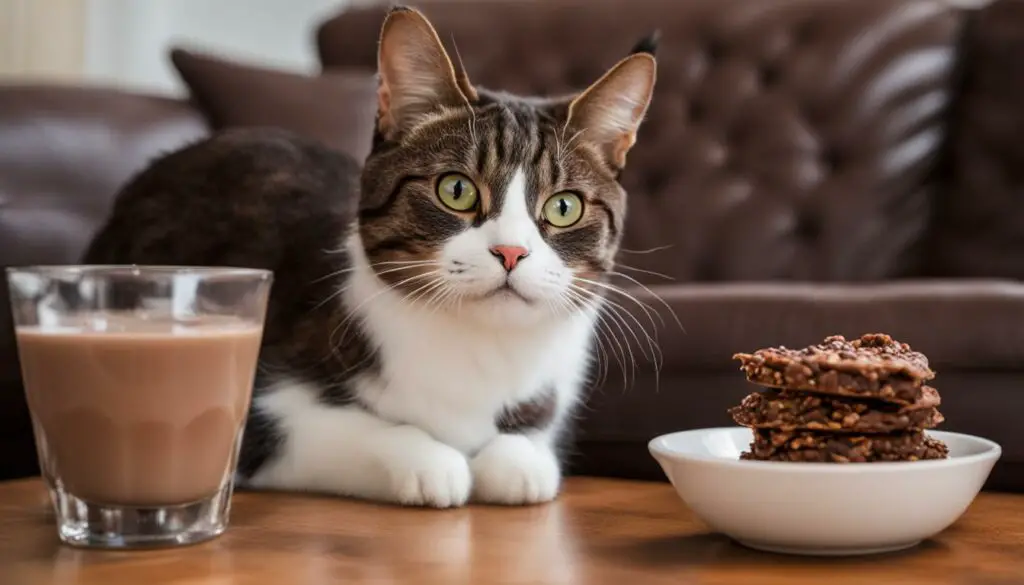
Conclusion
After thorough research, it is clear that chocolate milk is not a safe option for cats. While cats may enjoy drinking milk as a treat, chocolate milk contains ingredients that can be harmful to their health. Cats are obligate carnivores, and their diet should primarily consist of meat. While small amounts of dairy, such as milk, can be tolerated by some cats, many are lactose intolerant and cannot digest lactose properly.
Chocolate milk, in particular, poses multiple risks for cats. It contains lactose, which can lead to gastrointestinal upset, causing symptoms like diarrhea and vomiting. Additionally, chocolate milk contains caffeine and theobromine, both of which can have negative effects on cats’ cardiovascular and nervous systems if consumed in large amounts. While chocolate milk is not poisonous, it should be given in moderation, if at all.
To ensure the well-being of our feline friends, it is best to avoid offering them chocolate milk altogether. Providing a balanced diet that meets their nutritional needs without the addition of sugary beverages like chocolate milk is the safest approach. If your cat enjoys the taste of milk, consider offering lactose-free milk as an alternative, or explore other milk alternatives on the market that are safe for feline consumption.
FAQ
Can cats safely consume chocolate milk?
No, chocolate milk is not a suitable beverage for cats. It contains lactose, which many cats cannot digest properly, and ingredients like caffeine and theobromine, which can be harmful to cats in large amounts.
Is chocolate milk toxic to cats?
While chocolate milk is not necessarily poisonous to cats, it can cause digestive issues, restlessness, and even seizures if consumed in large quantities. Theobromine, found in chocolate, is not easily metabolized by cats and can lead to toxicity.
What are the potential dangers of chocolate milk for cats?
Chocolate milk can cause gastrointestinal upset, such as vomiting and diarrhea, in cats due to the presence of lactose and sugar. The caffeine and theobromine in chocolate milk can also have negative effects on a cat’s cardiovascular and nervous systems.
Can kittens have chocolate milk?
No, it is not recommended to give chocolate milk to kittens. Their developing digestive systems may be even more sensitive to the lactose, sugar, caffeine, and theobromine in chocolate milk.
What happens if a cat drinks chocolate milk?
Cats may experience symptoms such as vomiting, diarrhea, abdominal pain, restlessness, and seizures after consuming chocolate milk. It is important to monitor their reactions and seek veterinary attention if any concerning symptoms occur.
How much chocolate milk can a cat have?
It is best to avoid giving chocolate milk to cats altogether. Even small amounts can have cumulative negative effects on their health over time.
What should I do if my cat drinks chocolate milk?
If you suspect or witness your cat consuming chocolate milk, remove any remaining milk and monitor your cat for any unusual symptoms. Contact your veterinarian if you notice gastrointestinal distress or other concerning behaviors.
Can cats have lactose-free milk as an alternative to chocolate milk?
Yes, lactose-free milk can be a safer alternative for cats who enjoy the taste of milk. Other milk alternatives, such as coconut milk and almond milk, can also be given sparingly if they do not contain added sugars or other harmful ingredients.
Are there risks to offering cats chocolate cereal milk?
Yes, chocolate cereal milk contains theobromine, which can be toxic to cats. It is important to keep all chocolate and chocolate-flavored products away from cats to prevent accidental ingestion and potential poisoning.
Can cats become obese from consuming chocolate milk?
Excessive consumption of high-calorie treats like chocolate milk can contribute to feline obesity. Cats who are overweight are at a higher risk of developing obesity-related health issues such as diabetes, joint problems, and heart disease.

